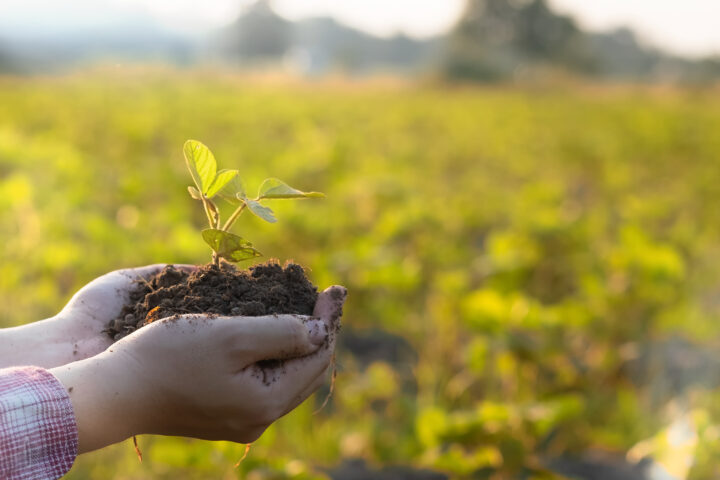
Global events require adjustments
The Swiss want as much local food as possible on their plates. A desire that is becoming increasingly difficult to fulfil. Farmers are finding it increasingly difficult to protect their harvests. No wonder the level of self-sufficiency is falling.
Wednesday, December 6, 2023
At the "Focus on Food" conference in November 2023, speakers from politics, science and business addressed current challenges and discussed how Switzerland is dealing with the current global uncertainties and securing supplies in the country.
On the positive side, the availability of food is a matter of course in Switzerland. The shelves in the shops are always full and the choice is almost endless. And yet, as the votes at the conference showed, this self-evident fact is coming under increasing pressure. "Globalisation - disruption, upheaval or new beginnings?" - global uncertainties and their impact on supply in Switzerland were at the centre of the event.
The introductory words of Ambassador Markus Schlagenhof, Federal Council Delegate for Trade Agreements, showed the area of tension in which Switzerland's agricultural policy operates. The Swiss population and the Federal Council want to preserve and protect agriculture. Local production and the cultural landscape are very much in favour. According to the fenaco Urban-Rural Monitor 2023, which Martin Keller from fenaco referred to in his presentation, the average desired level of self-sufficiency in food is 70 per cent - but the trend is pointing in the opposite direction: . The net self-sufficiency rate of Swiss agriculture has fallen from 55 per cent in 2012 to 45 per cent in 2021, as a recent report by Agroscope shows.
At the same time, as a globally oriented economy, Switzerland is dependent on trade that is as free as possible. However, free trade agreements are always associated with questions of market liberalisation. And the protectionist line in agricultural policy is often a challenge in negotiations, as Schlagenhof says. However, it is also clear that a secure supply can only be achieved thanks to efficient domestic agriculture in combination with imports of agricultural goods.
In view of geopolitical tensions and the pandemic experience, the population wants as much food as possible to be produced in Switzerland. However, the growing population and dwindling arable land make this a Herculean task. Without efficient utilisation of the available land, this desire cannot be met. And it is precisely here that the contradictory attitude inherent in many Swiss people and official policies becomes apparent: people want products to be produced as locally as possible and cultivated land to be protected. At the same time, the use of pesticides has been massively reduced - without having any realistic alternatives at hand. An equation that cannot work.
It is obvious that agriculture is only efficient if it maximises the production of high-quality products from the available land. And this requires crop protection.
However, as Martin Keller from fenaco points out, farmers have fewer and fewer opportunities to protect their own crops in the field. With reference to the Swiss Farmers' Association's "Plant Protection Situation Report 2023" and the Federal Council's response to interpellation 21.3692, he shows how dramatically the available plant protection products have decreased in recent years: Between 2016 and 2021 alone, 67 active substances and 511 products were withdrawn from the market. In the same period, only 28 new active substances and 252 corresponding products were authorised for the market. This means that around 40 active ingredients and around 250 products have disappeared in five years. No wonder, farmers are often no longer able to protect their plants sufficiently, and production losses are already a reality. As Markus Hochstrasser from the Zurich Plant Protection Service at Strickhof pointed out at a media conference organised by the Zurich Farmers' Association at the beginning of November, more and more crops no longer have effective protection, including potatoes, sugar beet, rapeseed, fruit, berries and vines. Productivity in the fields decreases, food waste and crop failures increase when pesticides are lacking, summarises Hochstrasser.
The authorities are increasingly reacting with emergency authorisations, i.e. temporary approvals. This is actually an indictment. After all, applications for new authorisations for plant protection products are piling up at the relevant authorities. It is impossible to say whether they are simply acting too timidly and anxiously due to political considerations or whether they are simply overwhelmed. What is clear is that this current authorisation practice is threatening the existence of farmers. And the authorisation practice is a nail in the coffin for the Swiss population's desire for substantial domestic production.
Rising prices with falling inflation
The inflation rate in Switzerland and the eurozone is showing signs of easing. However, as the SonntagsZeitung reports, this does not mean that the prices of essential goods are falling. They are just rising less quickly. While economists are breathing a sigh of relief, consumers are still faced with rising prices. "... if the inflation rate falls, this means nothing other than that prices are continuing to rise, but at a slower rate than before," writes Armin Müller. Energy prices have been particularly affected by price increases in recent years, but food prices have also risen massively. For example, coffee, butter and pasta are around 15 per cent more expensive, while milk and bread are more than 10 per cent more expensive.
Kindly note:
We, a non-native editorial team value clear and faultless communication. At times we have to prioritize speed over perfection, utilizing tools, that are still learning.
We are deepL sorry for any observed stylistic or spelling errors.
Related articles

Lack of diversity becomes an existential problem
The dwindling genetic diversity in fields is becoming an increasing problem. Unfortunately, this problem is growing steadily, partly because politicians in Switzerland and the EU are viewing the issue through ideological lenses instead of listening to science.

Research into fungal diseases in Lyon
Fungal diseases are one of the greatest threats to global food production. They endanger crops, cause billions in damage every year and have always put farmers under pressure. A detailed report by RTS provides insights into Bayer's global research and development centre in Lyon, where new, environmentally compatible fungicides are being researched.

Science sounds the alarm: Federal Council draft slows down innovation
The new genomic breeding methods are regarded worldwide as a source of hope for climate-resilient agriculture – precise, efficient, and safe. While countries such as the US, Japan, and soon the EU are pushing for deregulation, the Federal Council's regulatory proposal remains tentative. Now researchers and industry are sounding the alarm: the proposed rules are so strict that they would effectively block innovation and application.

Approvals are becoming a brake on innovation worldwide – and agriculture is being left behind
New findings from the United States highlight what has long been a reality in Europe and Switzerland as well: the development and approval of new crop protection products has become such a complex, lengthy, and costly process that even innovative, sustainable solutions can hardly reach the market anymore.

